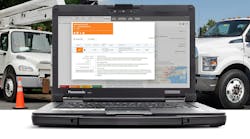COMPANY:
Berry & Smith Trucking Ltd. Penticton, BC
OPERATION:
Truckload and intermodal carrier Dorothy Vankoughnett, controller and IT manager
Problem:
With leased owner-operators providing 83 of its 100 power units, Berry & Smith were relying on cellphones for dispatching and keeping track of drivers' status. Calls to notify the company when loads were picked up and delivered were time-consuming for both drivers and dispatchers, says Dorothy Vankoughnett.
Relying on calls also made it cumbersome to manage detention times at customer locations, she says.
“Let's say a customer had a one-hour window for unloading,” explains Vankoughnett. “The drivers would only call us after they had waited for an hour, which meant we had to deal with a detention issue,” she adds. “We want our drivers making dollars, not sitting, especially with the new hours-of-service rules.”
Solution:
Although the fleet tested onboard computers and wireless data service in 1999, other more immediate needs put the project on the backburner. In 2004, though, Berry & Smith decided it was time to outfit all of its leased and owned equipment with a mobile communications system from PeopleNet. As part of the program, the fleet paid for the onboard hardware and also pays the monthly service fees for its leased drivers.
When the carrier first installed the systems, it relied on the drivers to manually send status reports, which automatically updated the fleet's Maddocks dispatch system. From the start, though, it intended to automate that process using PeopleNet's PACOS automated messaging and exception management tool.
“We're in Phase 1 of implementation now,” says Vankoughnett. Using the system's geofencing ability, driver arrivals and departures are automatically sent to the dispatch system without any driver input.
“That lets us make detention-time management more proactive,” she says. “If a driver is nearing the detention limit, we can notify the customer so they can act before we have to enforce accessorial charges. It also provides proof to customers of when the driver arrived and how long they sit.”
The fleet also believes it can use the automated geofencing to help it address border crossing delays.
“We have a record of where we crossed, what day and what time, so we can talk to the customs people about addressing recurring delays,” says Vankoughnett. “For example, with our reports we can tell them that at 4 o'clock on Friday at this particular crossing there's a problem with delays.”
Phase 2 of the PACOS implementation will automate the email notifications sent to customers, eliminating the need to have dispatch forward the alert, Vankoughnett says. “We're also looking forward to the new G3 [onboard units] so we can fax documents right from the trucks to the brokers for customs clearance.”


